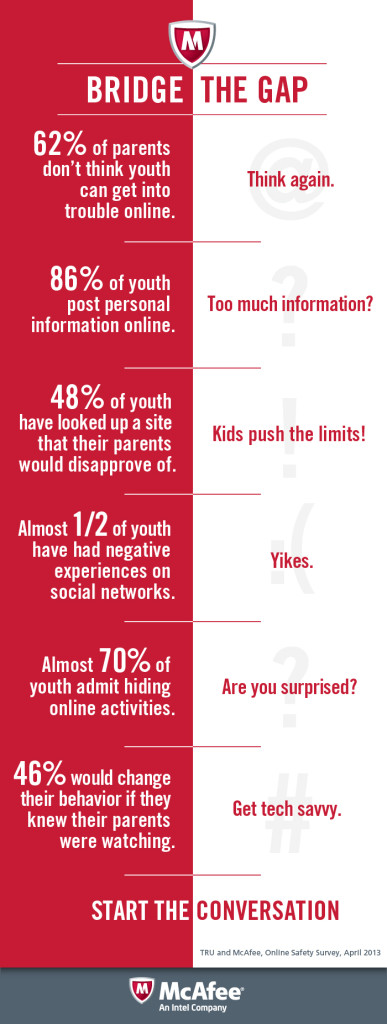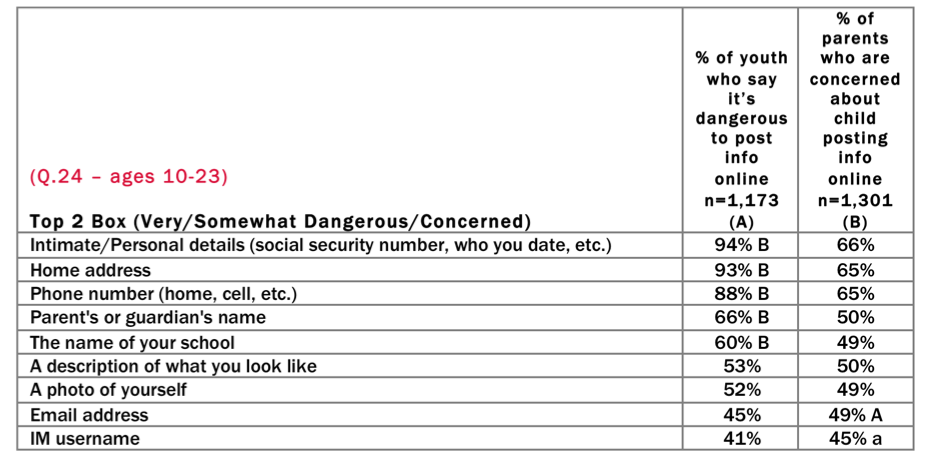
A new study from McAfee Titled “2013 Digital Deception: Exploring the Online Disconnect Between Parents and Kids” has just been released this June 2013.
The findings are alarming to say the least:
If you are a parent, educator, in law enforcement or a cyber safety expert, this research certainly gives us all something to think about!
Below are some of the statistics and my comments on them.
TRU, a leader in teen research, in partnership with McAfee conducted a total of 2,474 online interviews among youth ages 10-23 and parents of youth ages 10-23. These interviews were split evenly among 1,173 youth and 1,301 parents
The Stats:
- On average, teens estimate spending approximately 6 hours a day online – significantly higher than parents, who estimate their teen spends approximately 4 hours a day online. (ages 10-23)
See the stats below….
- 76% of young people use a mobile device to access social media. (ages 10-23)
- 56% use a password on their mobile device. (ages 10-23)
- 22% admit to using a mobile device to hide their online behavior from their parents. (ages 10-23)
Parents often think “online” means on a PC or on a gaming console they don’t count phones or mobile devices as being online, and some parents are totally unaware of how long kids spend on these mobile devices.
-
Most young people (86%) believe social sites are safe, and their parents agree (85%). (ages 10-23 )
So parents either think their children are acting responsibly online….or they really don’t think it’s very likely that their child will get into trouble online.
On the whole parents are allowing their underage children to have Facebook accounts when the age is set at 13yrs+
- Almost all (95%) young people have at least one social media account. (ages 10-23)
- 87% check their account daily.
- 79% of parents believe this to be true.
So this is why there are so many kids under 13yrs of age allowed on Facebook, Kik and Instagram, because parents believe that their primary aged child is unlikely to get into trouble online.
- 54% say their parents don’t have time to check up on their online behaviour. (ages 10-23)
- 42% even say their parents don’t care about what they do online. (ages 10-23)
- Yet, nearly half (46%) would actually change their online behaviour if they knew their parents were watching. (ages 10-23)
So supervising your children online or friending them on social media can help online behaviour. Unless the child creates another account where they do whatever they want to do…see below
Young people learn how to hide their online behaviour from their parents.
- 58% of tweens say they know how to hide what they do from their parents, and this number jumps to 65% for teens, and 80% for young adults. (ages 10-23)
Many of the teens in this study admitted that despite the warnings, they were participating in unsafe behaviour online. Parents unwillingness to supervise their children online makes this deception easier.
Ultimately, parents admit that they are overwhelmed by the task of governing their child’s online behavior.

Notice that parents of tweens 10-12yrs are the most challenged! Which is why we are noticing an increase in the amount issues arising around Facebook, Instagram and Kik in primary schools.
- 71% of parents claim to have had a conversation with their child about being safe online. (ages 10-23)
- Only 44% of young people agree.
There’s clearly a communication break down here.
- Three in five (62%) parents don’t think their child can get into that much trouble online. (parents of ages 10-23)
- Only 17% believe the online world is as dangerous as the offline world. (parents of ages 10-23)
Which is perhaps why parents don’t feel the need to have conversations about good online behaviour or supervise their kids online.
- 27% of youth have witnessed cruel behavior online. (ages 10-23)
- Only 9% of parents are aware of this.
- 89% say this cruel behavior took place on Facebook. (ages 10-23)
This statistic surprises me, I would have thought it would be higher. But it does show that parents aren’t informed when children have a bad experience online, they are out of the loop according to this study, and Facebook is still the platform this cruel behaviour is most likely despite so many parents allowing their children to have a Facebook account.
- 14% of respondents aged 13 through 23 have hacked into someone else’s social network accounts or emails.
‘Hacked” can mean, you left your account open so I jumped in and posted an update…
I think the table below shows one of the most concerning set of statistics:

Why concerning? When talking to teachers, youth workers and law enforcement officers, apps like Kik Messenger and Instagram are coming out on top for reports of cyber bullying, harassment, impersonation, and approaches from strangers, yet both children and parents place I.M (instant messenger) user name and photos of yourself being posted online as being very low down on the risk list. Many children are being approached by strangers because they are posting their Kik Messenger profile name on other social media apps. And easily downloadable photos are being used to impersonate in order to bully, and to humiliate and cyber bully.
Conclusion:
If you look at the entire survey the overall message is, the younger the child, the less supervision online they are receiving. And overall parents feel overwhelmed and unable to keep up with what their children are doing online. Parents appear to have simply given up, and their children, by their own admission are doing exactly what they want, good or bad, despite the warnings.
The statistics taken from this sample of parents and children, if similar to Australian behaviour, certainly reinforces what my observations have been, particularly this year, with more primary schools contacting me to give talks, and more parents contacting me with incidents that are happening to primary aged students. The message from this sample is that parents just can’t afford to delay their own online education and wait until their kids are in high school. Giving up on technology really isn’t the answer when kids are getting into trouble online at younger and younger ages, with or without mum and dad being aware of it.
This study also shows that many parents aren’t communicating well with their kids about online safety, and many parents are not feeling confident about supervising their kids online. As a result according to this sample, the kids are definitely outsmarting their parents in every single way online. At the same time both parents and children seem to be living in a bit of a “fools paradise” thinking that nothing will go wrong online.
This is probably why most parents are not bothering to turn up to talks by police and cyber safety advocates, it appears that they’ve either given up on trying to supervise their children online, or feel that their children are quite safe on their own online.
So for cyber safety advocates, educators and law enforcement, if this study is an indication of a world wide trend, this means that the majority of parents will probably continue to ignore any calls for cyber safety education for themselves. Will continue to rely on schools to educate and council their own children’s online behaviours, regardless of any warnings from authorities.
Unfortunately it seems a lot more children will have to have bad experiences online, and their parents will need to find out about these bad experiences, before parents will realise that they need to be involved and educated.
The conclusion from McAfee from this survey is pasted below:
- Young people live in a world of constant connection, enabled by the widespread adoption of social media and increasing mobility of online content.
- Both parents and young people continue to believe that online sites are safe as long as caution and judgment are employed, and young people believe their parents trust them to make smart decisions online.
- Despite this parental trust and their awareness of potential threats, many young people choose to take risks by posting intimate, personal information and/or questionable commentary online, often without parental awareness.
- This behavior begins in the tween years, gathers momentum among teens, and becomes relatively common in young adulthood.
- As a result of their behavior, some young people have lost friends, been punished, or have felt fearful for their safety.
- Further, more than one in four have witnessed cruel online behavior; and some have been victims themselves. Typically, parents remain clueless.
- Parents claim to regulate and monitor their child’s online behavior, yet far fewer young people agree.
- Further, many parents ultimately admit that they are overwhelmed by technology, outsmarted by their children, and don’t have time to keep up with modern online advancements.
- Young people use their parent’s limited tech acumen and time constraints to their advantage, finding ways to hide their participation in risky and sometimes illegal activities.
- Therefore, parents remain in the dark about their child’s online activities.
- Parents must realize that young people are aware of the threats associated with risky online activity, yet will continue to engage in this behavior.
- Therefore, simply monitoring their child’s behavior and implementing parental controls are not enough – many young people know how to bypass these barriers!
- To offset this, parents must not be afraid to act as a guide for their child.
- In addition to monitoring and setting parental controls, parents must engage their child in dialogue about how to be safe online and what the implications and potential outcomes of unsafe online activity could be.
- Further, these conversations must happen early and often – first, in the tween years before they begin experimenting in deceptive and risky behavior, and repeatedly throughout their teen years, when they are most at risk.
- Doing so poises parents as experts, confidants, and the go-to source for young people as they navigate and create their presence in the online world.
See The Study Here: http://www.mcafee.com/us/resources/reports/rp-digital-deception-survey.pdf

Homepage besuchen…
New Study Shows Parents Are Just As Clueless As Ever About What Their Kids Are Doing Online! | The Cyber Safety Lady…
Good blog post . Incidentally , people are wanting a a form , my
company filled out and esigned a blank form here
http://goo.gl/sKgHCo.